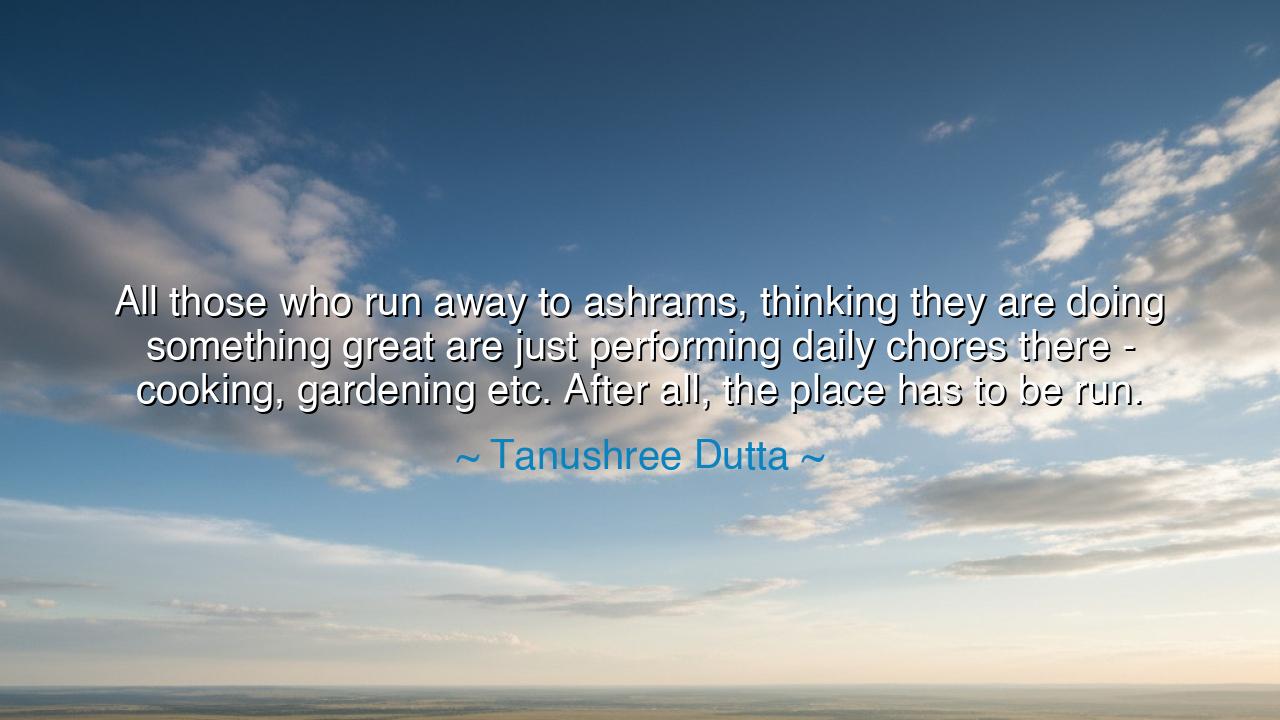
All those who run away to ashrams, thinking they are doing
All those who run away to ashrams, thinking they are doing something great are just performing daily chores there - cooking, gardening etc. After all, the place has to be run.






In the quiet corners of the world, there are those who seek refuge from the chaos of life, who wander toward the spiritual sanctuaries of the ashrams, believing that by retreating into these sacred spaces, they are stepping away from the mundane to reach the divine. Tanushree Dutta, in her words, offers a profound insight into this age-old pursuit: "All those who run away to ashrams, thinking they are doing something great are just performing daily chores there—cooking, gardening, etc. After all, the place has to be run." These words echo with a deep and ancient truth: that spirituality and the quest for enlightenment are not found in escaping the world, but in recognizing the inherent sacredness in the simple, daily tasks that sustain it.
The idea of running away to a place of solitude in search of truth is not a new one. In the ancient world, many sought to find wisdom in isolation—monks, hermits, and sages alike withdrew from the noise of society to focus their minds on higher pursuits. But in their solitude, they too found that life could not be separated from the everyday. The great Buddha, after his awakening, chose not to retreat into the mountains but to walk amongst the people, teaching that enlightenment is not a state of escape, but one of integration. He understood that even in the quiet of the forest, the mundane tasks—gathering food, tending to the earth—were necessary for the sustenance of the spirit.
Tanushree Dutta’s reflection brings to light an important teaching of the ancients—that no matter where we are, no matter how far we wander in search of truth or peace, we are never free from the responsibility of daily life. Even in the most revered places, such as ashrams, where the soul seeks to soar, the body must still be nourished, the space still must be maintained, and the work of living must go on. This is the great paradox of human existence: that we cannot separate ourselves from the world, for it is in the very act of living that we find the path to enlightenment.
Consider the life of the ancient sage Krishna, who, though a divine being, lived amongst the people, engaging in the simple acts of daily life. Whether it was tending to his cattle, performing chores in the house, or offering guidance to the warrior Arjuna on the battlefield, Krishna embodied the understanding that divinity does not lie in retreat, but in engaging with the world as it is. He taught that one could find the highest form of spirituality in the humblest actions. It was not in escaping life's tasks that one found truth, but in performing them with devotion and awareness.
The ancient yogis also understood this deeply. They spent their days in meditation, yes, but they also engaged in manual labor—planting, cooking, and cleaning. These tasks were seen not as distractions from their spiritual journey, but as integral parts of it. The yogic practice of karma yoga teaches us that selfless service—even in the most mundane tasks—is a path to liberation. By performing tasks with full attention and without attachment to the outcome, the yogi purifies the mind and soul, finding the divine in every act, no matter how small. Tanushree Dutta’s words serve as a reminder that greatness is not found in running away from the world but in finding the sacredness within it.
To run away to an ashram, to retreat from the world, is not inherently wrong. But it must be understood that the path to enlightenment is not a path of escape; it is a path of integration. The chores of the ashram—be it cooking, cleaning, or tending to the garden—are not burdens, but opportunities to embody the very principles of spiritual practice. As Ralph Waldo Emerson once said, "The way to know life is to live it." The true test of spiritual growth lies not in removing oneself from the world, but in being present in it, in performing even the most humble tasks with a heart that is open and a mind that is aware.
Therefore, take this lesson to heart: life, in all its forms, is a spiritual practice. Whether you are in an ashram, at home, or walking through the marketplace, the sacred is found not in the escape from life, but in the engagement with it. Daily chores, whether cooking, cleaning, or tending to the earth, are opportunities to cultivate mindfulness and devotion. In the simplest acts of life, we find the chance to bring the divine into our very actions. So, do not seek to run away from the world in search of spirituality, but engage deeply with it, knowing that in every action, every moment, you have the chance to create something sacred.






AAdministratorAdministrator
Welcome, honored guests. Please leave a comment, we will respond soon